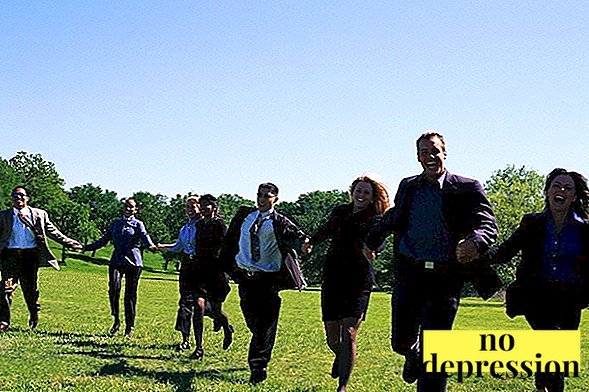Our brain is a real super machine with billions of neural connections. Sometimes he behaves well: he remembers the necessary information and in time he finds the answer. But sometimes the brain likes to play with us and throws up different puzzles: it stumbles the name of a favorite music band into the back streets of memory, it will give out a new solution to the problem when you don’t even think about it. But this is not enough for him.
When we are in a new place or situation, we realize that previously lived it all. "Deja vu!" we exclaim in surprise, but do not fully understand the nature of this phenomenon. Why does memory play charades with us? Want to suggest an answer or give misinformation? Is this generally normal? The phenomenon has a lot of clarifications and so many mysteries.
What is deja vu
Deja vu (already seen) is an illusory feeling or feeling that this event has been experienced before or had a dream in a dream. Perception does not concern a specific event, but sensation in general. It arises from nowhere and lasts no more than a few seconds. These are phenomena individually. Someone experiences it occasionally, someone quite often. Although there is no official statistics yet, it is estimated that between 60% and 97% of adults are familiar with this feeling.
The phenomenon of deja vu no physical sensations and there is no scientific explanation for the phenomenon either. In the words of the comedy hero: "science is not up to date". The phenomenon is so unpredictable that it’s impossible to hope for equipment. Scientists cannot attach sensors to all subjects for a sudden result for months (or even years). There are workers researching neuroscientists and a lot of speculation on this topic from the prophetic predictions of the future. Perhaps sometime scientific confirmation of research will be obtained, but for now everything remains at the level of descriptions and assumptions.
The effect of "already seen" has several similar concepts:
- Deja senti (already felt) - a person feels that the thought that is taking him now has already occupied him. He understands that he forgot something important and finally remembered. As a rule, the feeling of “deja senti” is accompanied by a feeling of satisfaction, but is quickly forgotten.
- Deja entende (already heard) - the first time he heard a man regards as heard earlier. Moreover, the effect of what is heard is accompanied by emotional and semantic details.
- Zamevyu (never seen) - the concept of the opposite of deja vu. The familiar environment, environment, objects suddenly start to amaze with their novelty, as if they are seen for the first time. The effect of zhamevyu is most pronounced in cases where a word repeatedly repeated loses its original meaning. If the feeling of déjà vu is considered only a game of consciousness, then the constant feeling of zhamevyu is a symptom of mental disorders.
- Groundhog Day - the portable concept of deja vu by the title of the film of the same name. It is connected with the trap of meaningless existence, when a person experiences similar emotions day after day. And it concerns not only negative, but also positive experiences, as if they were retaken for a carbon copy.
A bit of history
Although there used to be works by philosophers on the subject of special mental states, the phenomenon "deja vu" (Deja vu) first named and described in his book, psychologist Emil Bouarak (1851-1917). Translated from French, the phrase means "already seen." Since that time, an active study and discussion of this concept began, but the scientifically confirmed data on this topic have not increased. The mysterious phenomenon still stirs the imagination of ordinary people and scientists. Ordinary people want to believe in their own psychic abilities, while scientists are interested in the fine line between hallucinations and reality.
The effect of deja vu was described by many psychoanalysts. Sigmund Freud believed that calling the feeling "already seen" illusion is unfair. is he called it the game of the unconsciouswhere the most base desires of a person are embodied, which even he himself is ashamed of. As long as a person is able to avoid these desires, he does not seem to know about them. But it is worth some details of the interior or the subject to cause certain associations, as if the memory on click provides the necessary memories. These "fake" memories overlap with reality, evoking the feeling of "already seen."
Poets, writers and artists were not indifferent to this nontrivial manifestation of human consciousness. And it was mentioned in a playful form, as the lack of novelty in the relationship, and in reflections on philosophical topics. Indeed, during the awareness of deja vu, “eternal” questions arise in the head about the cyclical nature of life, the repetition of past mistakes or parallel life in several dimensions.
Why does deja vu arise
Today, the question "what is deja vu and why does it happen" is investigated along with other phenomena of the human brain. Laboratories, where scientific research is carried out, are equipped with the newest and most supersensitive equipment. Scientists say that it only seems to us that the brain serves us. In fact, he simply allows us to think so. That plays with us in the game, throwing puzzles. Until there is no exact scientific explanation, you can formulate for yourself deja vu somehow. But there are several interesting theories about the emergence of this intriguing sensation, which can slightly lift the veil.
Hologram theory
The most recent research in the field of neurophysiology has shown that our memories do not fit into separate cells, like storage rooms. Memory is broken into small fragments. and dispersed in different parts of the brain. For example, you are tasting a new dish. Its taste is "recorded" in one place, the color of the ingredients - in another fragrance - in the third. And at the same time there are memories of the weather outside the window, interlocutors, clothes that everyone was wearing, your well-being at that time, music that was playing in the restaurant.
And they are also recorded in memory in conjunction with a new dish. And the memories of the event can cause not only a new trip to the restaurant, but also a similar color of the tablecloth on the table. For example, for the first time you come to a dinner for friends, see the same tablecloth on the table and exclaim “deja vu! I already remember this situation”. Only the food and the shade of the tablecloth are real, and our brain draws all the other sensations on the basis of a hologram.
Memory failure
If we turn to computer terminology, deja vu is a glitch of human memory. When it seems to us that the event is completely erased from our "subcortex", then it only seems to us. Everything that enters our brain remains in it forever. It contains megatons of information, up to the taste of lipstick on the lips during the tasting of a new dish. And we receive information through different channels: through eyes, ears, mouth, tactile sensations. As long as everything goes as it should, information like cars on the road moves in the right direction.
But if suddenly there is a congestion on the brain’s “track”, the information ceases to be synchronous. Then, to recreate a complete picture, the brain obligingly provides us with a fragment from memory, and sometimes even generates "memories" of events that were not at all in life. And the speeds in the neural network are not comparable with ours - these are nanoseconds or even smaller values. Therefore, we do not even have time to follow the substitution and feel an obscure feeling of deja vu.
Seen in a dream
Scientists say that human memory, like a computer, is divided into operational and permanent. Everything seen during the day accumulates in RAM. And even that information is recorded, to which we did not pay attention at all. Sleep is needed in order to process daily information and archive it in the right parts of the brain. Archiving into permanent memory takes place not in the form of numbers or pictures, but in the form of images. Indeed, in a dream, the brain functions in a special mode - it works with the unconscious, without being distracted by external stimuli.
This theory clearly explains the insights of scientists, which occurred during the rest, and also brings a little closer to understanding deja vu. In the subconscious all what is seen is stored as associative imagesthat come to us in dreams. Therefore, dreams or the feeling of “already seen” is nothing but the images of our unconscious, which have nothing in common with mysticism or clairvoyance. But if you learn to recognize them, you can learn how to make predictions.
Reincarnation
Religions, in which reincarnation is recognized, describe in their own way why there is a deja vu. It is believed that the phenomenon of "already seen" has its own, separate reality. The soul for thousands of years is repeatedly born and repeatedly dies, accumulating memories of past lives. Therefore, it is not surprising that for the first time a person sees a person, a building or a tree and recognizes them. Deja vu in the theory of transmigration of the soul is not a game of imagination, but very real memorieswho managed to break through the many rebirths of the body. This explains the effect of meditation: when a person is immersed in himself so that the consciousness is transformed and begins to produce amazing information.
In total there are about 8 of the most popular theories regarding the emergence of the feeling "already seen." But the feeling that we experience from time to time causes fleeting interest. But the feeling of endless running around worries modern people more and more. When a way of life ceases to give the most important thing - happiness, people want to change something so that they no longer experience this sensation of running in a circle.
Groundhog Day or Autopilot
The film "Groundhog Day" is not for nothing considered a masterpiece. In addition to constantly recurring scenes, he has a profound meaning: if circumstances do not change, it’s time to change yourself. Artificially changing circumstances without internal change, we simply transfer old problems to new decorations. And after a while, "Groundhog Day" begins again.
Perhaps there are few people who are completely satisfied with their lives. But if something repeats every day, it becomes a source of stress even for people who value stability most of all in life. Without new emotions, without development, the brain atrophies like the muscles of a bedridden patient. Gradually, he stops reacting even to simple things that always brought joy. Here are signs that you are stuck in the "Groundhog Day":
- You constantly feel deja vu.
- You feel that life is stalling on the spot and not moving anywhere.
- You remember only negative events.
- You feel yourself on the sidelines of life, you miss all the fun.
If these feelings are familiar to you, then it is time to change something. Someone vomits "lively", prefers to change everything in one day. Someone methodically, day after day, makes changes. It is important to choose a comfortable pace for yourself, but do not stray from the course even in a bad mood. Tips on how to stop living on autopilot a lot. Here are the most vital and feasible, proposed by famous coaches:
- Do not pay attention to your age, never late to start.
- Look at events through the eyes of a successful person you want to be like.
- Remembering past achievements - they will become the basis for new victories.
- Appreciate yourself, do not wait for others to appreciate you.
- Remember that time is enough for all classes.
- Accept compliments and any help, allow yourself love.
- Do not clog the brain with unnecessary information, it is roomy, but not dimensionless.
- Make a list of interests and set aside time for them, like going for groceries.
- Doubt the allegations, because not everything can be trusted.
- Search for what unites you with your family, and not alienates them.
- Remember that fear is a natural reaction to change for the better.
- Allow others to love you, not your mask.
Findings:
- Deja vu is not mysticism, not clairvoyance, but a game of our brain
- The concept of "previously seen" has similar concepts "already felt" and "already heard"
- If the feeling of deja vu causes negative emotions, then it’s time to change your life.



